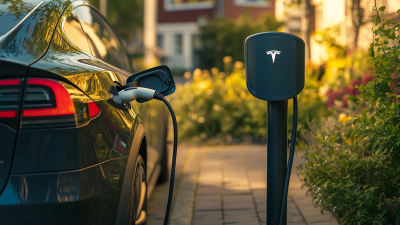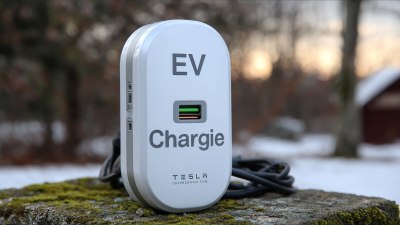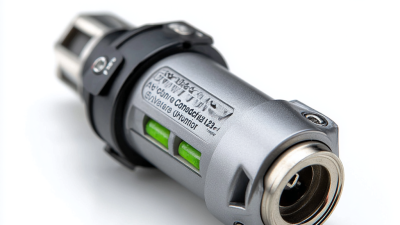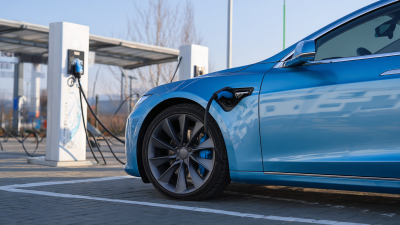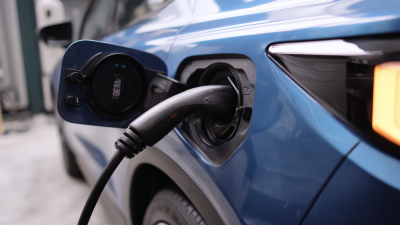As the electric vehicle (EV) market continues to gain momentum, with a projected increase to 145 million EVs on the road by 2030 according to the International Energy Agency, the need for proper charging solutions is more critical than ever. One integral component in optimizing electric mobility is the EV adapter converter, which plays a vital role in ensuring compatibility between various EV models and charging infrastructure. With the growing array of EVs equipped with different connector types, understanding the nuances of choosing the right EV adapter converter can significantly enhance the charging experience. Industry reports indicate that inadequate charging solutions can impede the adoption of electric vehicles, underscoring the importance of informed decision-making in this area. This guide aims to provide comprehensive insights and practical tips on selecting the ideal EV adapter converter to facilitate seamless electric mobility.

Understanding electric vehicle (EV) charging compatibility is crucial for any EV owner looking to streamline their charging process. With the global transition to electric mobility steadily increasing, reports suggest that by 2030, approximately 30% of all vehicles will be electric, leading to a greater demand for standardized charging solutions. EV adapters are essential for enhancing compatibility across different charging stations and vehicle models. Currently, there are several types of adapters, including Type 1, Type 2, CCS (Combined Charging System), and CHAdeMO, each serving specific regions and vehicle brands.
For instance, the International Energy Agency (IEA) notes that Type 2 connectors are prevalent in Europe, whereas Type 1 is commonly used in North America and Japan. Furthermore, the CCS option is gaining traction for fast-charging scenarios, with data indicating that CCS-equipped stations rose by over 45% in 2022 alone. Understanding these nuances not only aids consumers in selecting the appropriate EV adapter converter but also ensures they can take full advantage of the charging infrastructure available, maximizing convenience and efficiency while transitioning to an electric future.
When selecting an EV adapter converter, it's essential to consider several key features to ensure optimal performance and compatibility with electric vehicles. According to a recent report by the International Energy Agency (IEA), the global electric vehicle market is projected to grow drastically, with over 145 million electric cars expected on the road by 2030. As this market expands, the demand for efficient charging solutions, including high-quality adapters, becomes increasingly critical.
One of the primary features to evaluate is the wattage capacity of the adapter converter. Higher wattage allows for faster charging times, which is particularly beneficial for users with demanding schedules. A study from EVBox highlights that adapters capable of delivering 22 kW can reduce charging times significantly compared to standard 3.7 kW models. Additionally, compatibility with various EV models is crucial; adapters that support multiple connector types, such as Type 1 and Type 2, offer versatility, catering to a broader range of vehicles and charging stations. As the market diversifies, investing in a comprehensive adapter converter ensures that users can charge effectively and conveniently, aligning with the growing infrastructure of electric mobility.

As the electric vehicle (EV) market continues to expand, the importance of selecting the right EV adapter converter cannot be overstated. According to a report by the International Energy Agency (IEA), global EV sales reached 6.6 million units in 2021, with projections indicating that this number could increase to over 23 million by 2030. This surge in electric mobility means that drivers need reliable and efficient charging solutions to support their increasingly diverse fleets of EVs. In 2023, several top brands have emerged in the EV adapter converter space, each offering unique features and compatibility options that cater to consumers' needs.

When reviewing the best EV adapter converters, it's essential to consider compatibility, charging speed, and safety features. Brands such as JuiceBox and AeroVironment stand out with models that not only support a variety of EV designs but also boast advanced safety measures, ensuring safe and efficient charging. The latest data highlights that about 70% of EV owners prioritize fast charging capabilities, reinforcing the need for adapters that can handle higher amperages without overheating or risking damage. Additionally, models that support smart technology, allowing users to manage their charging sessions through mobile apps, are gaining traction among tech-savvy consumers. As the industry evolves, having the right EV adapter converter in 2023 will be crucial for optimizing the electric driving experience.
When utilizing electric vehicle (EV) adapters and converters, prioritizing safety is paramount. Each adapter is designed with specific voltage and amperage ratings, and using an incompatible adapter can lead to overheating, electrical fires, or damage to your vehicle's battery. Always check the specifications of both your EV and the adapter to ensure compatibility. Additionally, inspect the adapter for any physical damage, such as frayed wires or cracked casings, before each use. Regular maintenance and careful handling can prevent potential hazards.
Another critical consideration is protecting your EV from power surges. Using a surge protector in conjunction with your EV adapter can mitigate risks associated with fluctuating electricity supply. It is also advisable to plug in your vehicle during off-peak hours to reduce demand and minimize the chances of tripped circuit breakers. Being knowledgeable about the operational limits of your charging equipment will enhance your charging experience and ensure the longevity of both your EV and the adapter.
When considering the transition to electric mobility, understanding the costs associated with EV adapter converters is essential for budgeting effectively. According to a report by the International Energy Agency (IEA), the global electric vehicle market is expected to grow by 35% annually, pushing up demand for accessories like adapter converters. Prices for these converters can vary significantly, typically ranging from $100 to over $600 depending on factors such as power output, compatibility, and additional features like smart technology integration.
In addition to the initial purchase price, it’s important to consider potential long-term savings. The U.S. Department of Energy indicates that using a higher-quality EV adapter converter can maximize charging efficiency, often leading to lower electricity costs over time. A quality converter may also extend the lifespan of the vehicle’s battery pack, saving consumers future replacement expenses. By conducting a thorough cost analysis, EV owners can make informed decisions that align with their budget while ensuring optimal performance of their electric vehicles.
